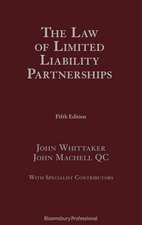EU Trade Mark Law and Product Protection: A Comparative Analysis of Trade Mark Functionality
Autor Lavinia Brancusien Limba Engleză Hardback – 13 iul 2023
| Toate formatele și edițiile | Preț | Express |
|---|---|---|
| Paperback (1) | 327.33 lei 3-5 săpt. | +25.69 lei 4-10 zile |
| Taylor & Francis Ltd. – 19 dec 2024 | 327.33 lei 3-5 săpt. | +25.69 lei 4-10 zile |
| Hardback (1) | 1012.58 lei 6-8 săpt. | |
| Taylor & Francis – 13 iul 2023 | 1012.58 lei 6-8 săpt. |
Preț: 1012.58 lei
Preț vechi: 1234.85 lei
-18% Nou
Puncte Express: 1519
Preț estimativ în valută:
193.82€ • 210.60$ • 162.91£
193.82€ • 210.60$ • 162.91£
Carte tipărită la comandă
Livrare economică 21 aprilie-05 mai
Preluare comenzi: 021 569.72.76
Specificații
ISBN-13: 9781032446318
ISBN-10: 1032446315
Pagini: 352
Ilustrații: 2 Tables, black and white
Dimensiuni: 156 x 234 x 21 mm
Greutate: 0.81 kg
Ediția:1
Editura: Taylor & Francis
Colecția Routledge
Locul publicării:Oxford, United Kingdom
ISBN-10: 1032446315
Pagini: 352
Ilustrații: 2 Tables, black and white
Dimensiuni: 156 x 234 x 21 mm
Greutate: 0.81 kg
Ediția:1
Editura: Taylor & Francis
Colecția Routledge
Locul publicării:Oxford, United Kingdom
Public țintă
Academic and PostgraduateCuprins
Introduction: How to deal with functionality in trade mark law in a practical way; 1. The legal framework of trade marks’ functionality in the EU; 2. ‘La raison d’être’ of functionality in the EUTM - A tool for balancing interests between legal exclusivity and enhancing competition; 3. The US legal framework of functionality doctrine. Areas of convergence with EU law; 4. Functionality within the framework of law and economics. Competition concerns against protecting functional trade marks; 5. Categories of signs falling within the scope of EU functionality refusal grounds; 6. Technical functionality; 7. Generic functionality - Signs resulting from the nature of goods; 8. The functionality of signs giving substantial value to goods; Conclusions
Notă biografică
Lavinia Brancusi is an adjunct professor at New Technologies Law Centre, Institute of Law Studies, Polish Academy of Sciences in Warsaw, Poland. She holds law degrees from the University of Warsaw, Faculty of Law (master, dr. iur.) with an award-winning doctoral dissertation in design law. Her research interests cover cumulative protection in intellectual property, with a specific focus on product protection, functionality in trademark and design law, as well as the interface between IP and competition rules, especially in relation to brands.
Descriere
This book employs scholarly analysis to ground practical tools for applying the EU Trade Mark law (EUTM) functionality refusal grounds to address business needs when registering trade marks consisting of product characteristics. It comprehensively examines the absolute grounds for a refusal of registration of functional signs under EUTM.











